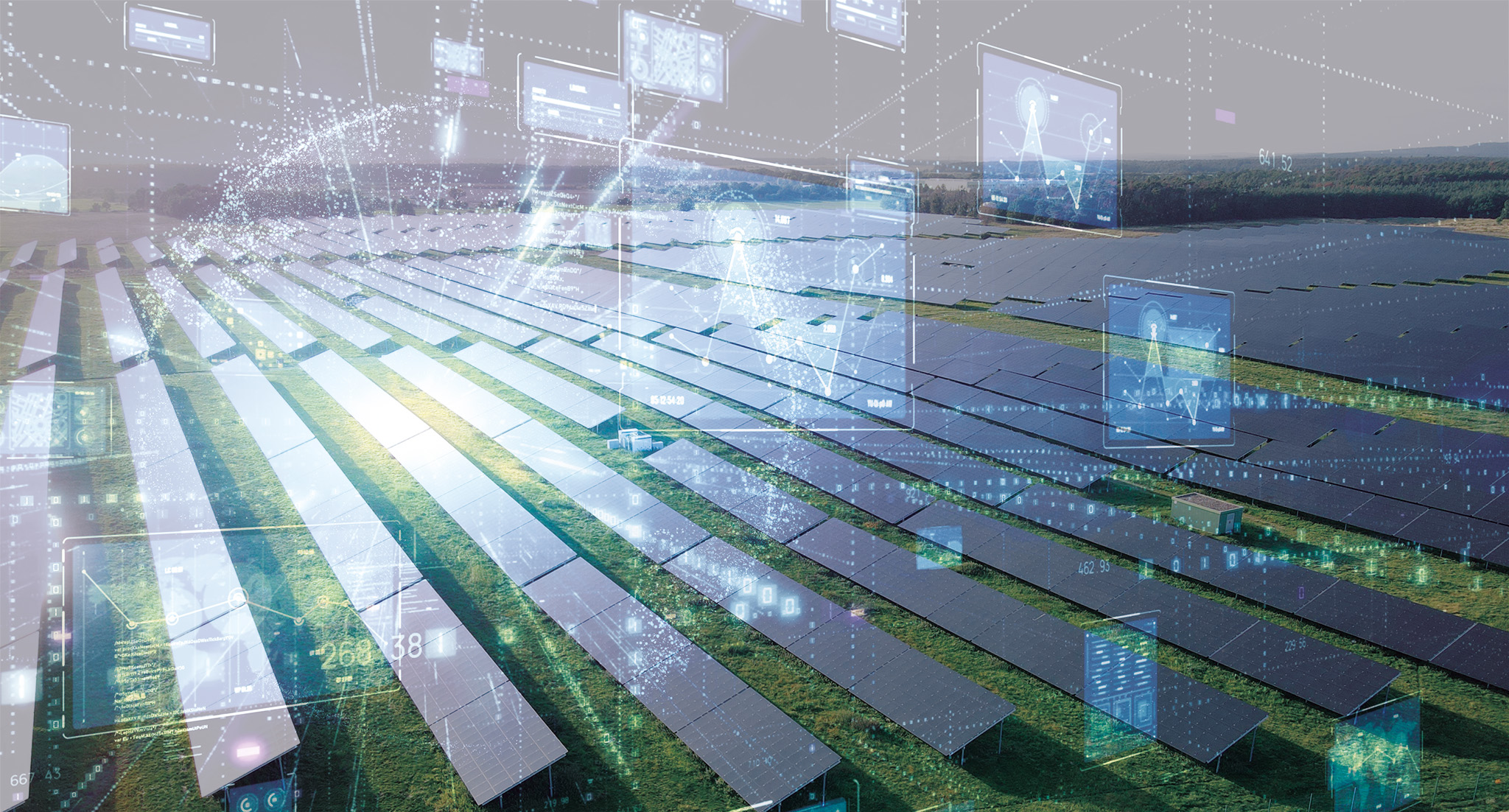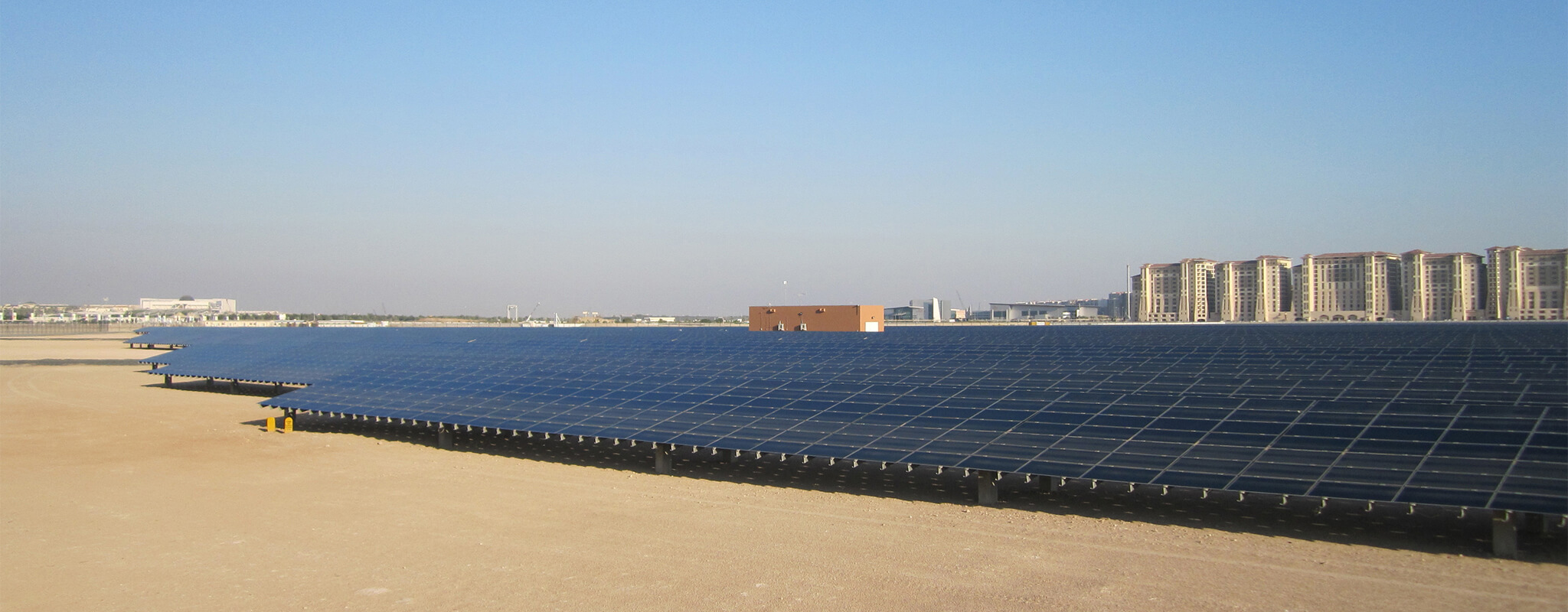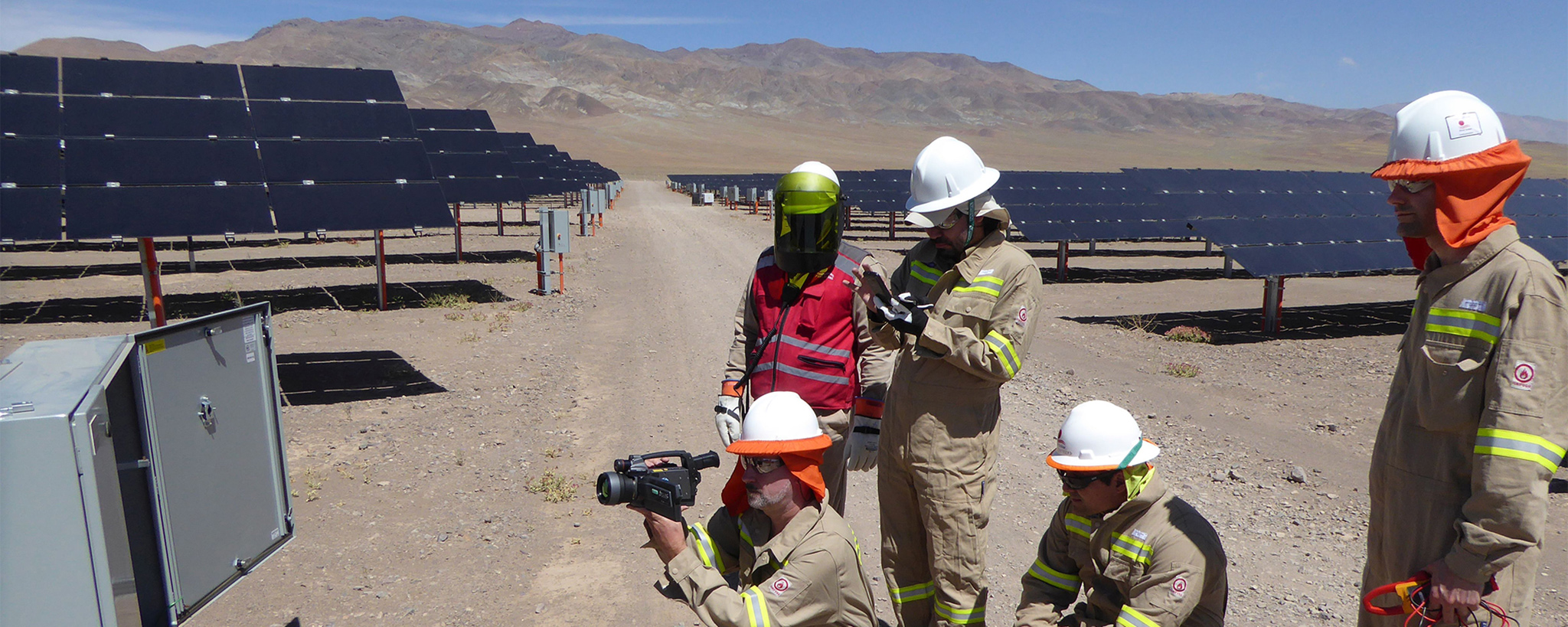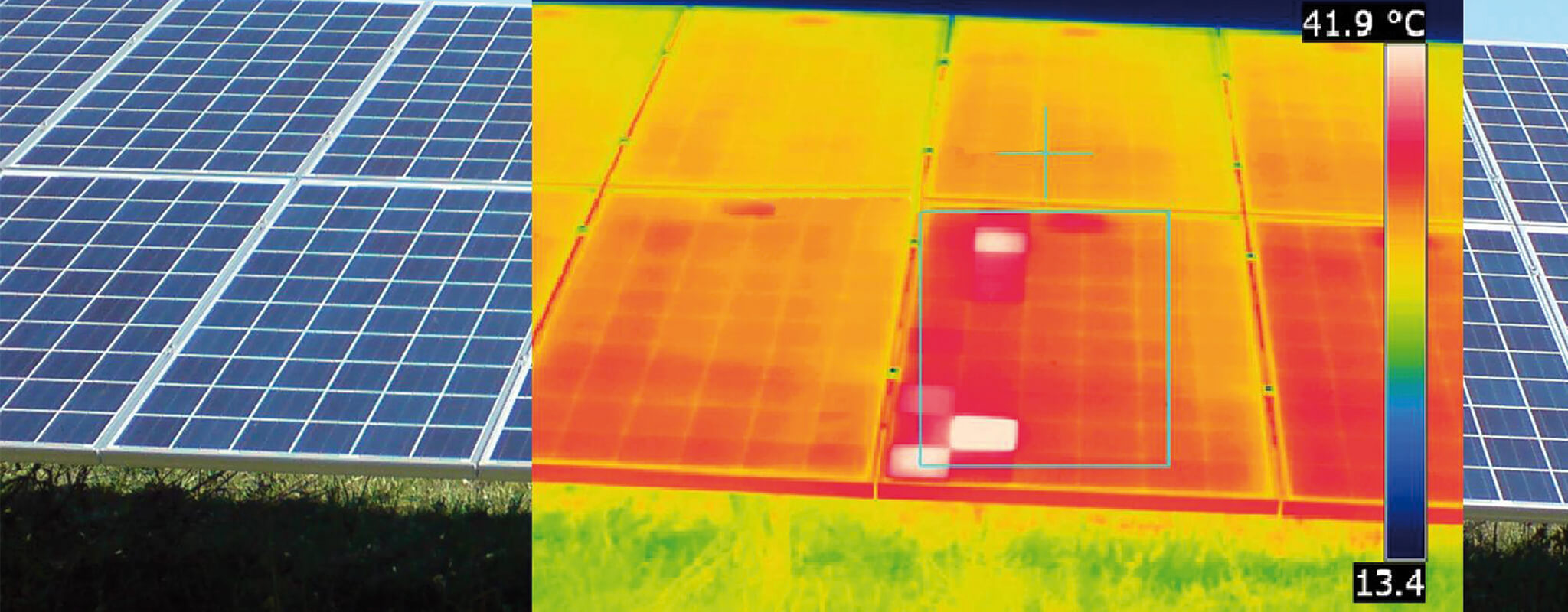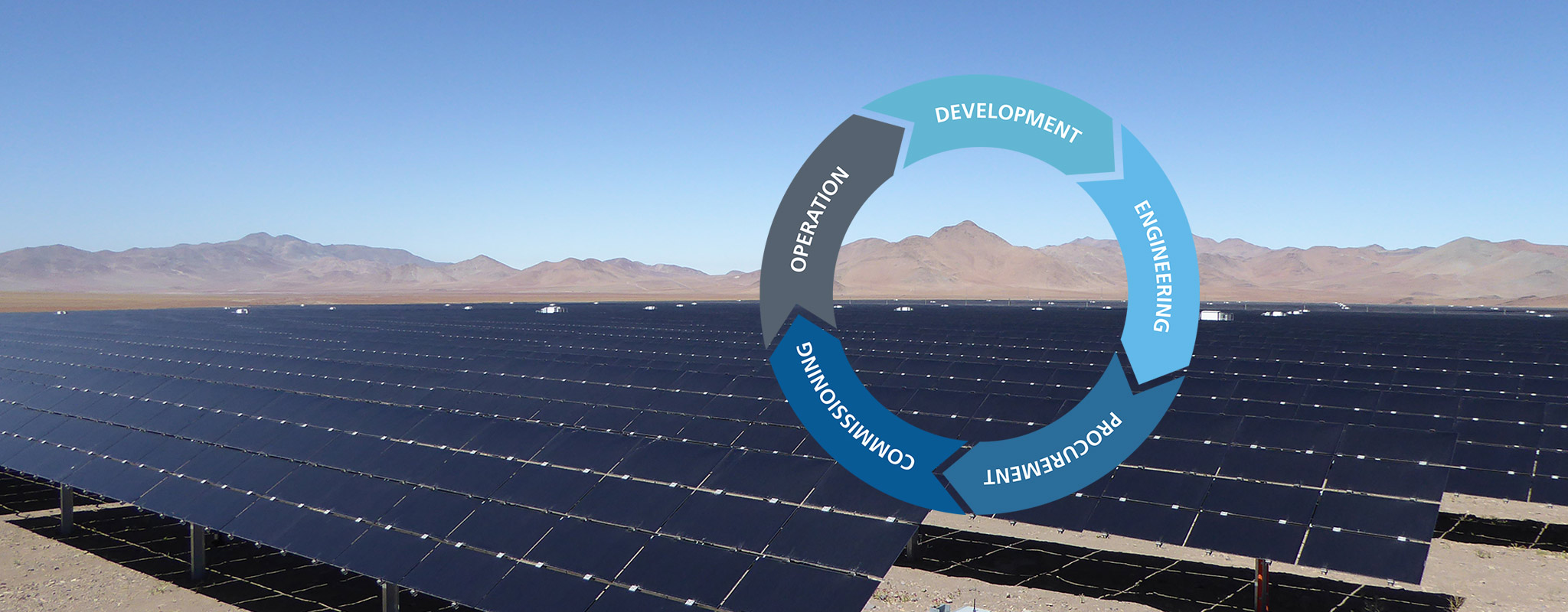Jahr
Year | Titel/Autor:in
Title/Author | Publikationstyp
Publication Type |
|---|
| 2023 |
Transformation of Germany’s energy system in the context of the EU Green Deal targets
Henning, Hans-Martin |
Vortrag
Presentation
|
| 2023 |
Energiesicherheit und klimaneutrale Energiesysteme
Henning, Hans-Martin |
Vortrag
Presentation
|
| 2023 |
Halbleiter als Schlüsselkomponente für zuverlässige PV-Wechselrichter - Felddatenanalyse zu Ausfällen und Stressoren
Kulenkampff, Felix; Franz, Sebastian; Hercegfi, Patrick; Menold, Lukas |
Vortrag
Presentation
|
| 2023 |
Field Data Based Analysis of Microclimates and Humidity in PV Inverters
Kulenkampff, Felix; Franz, Sebastian; Hercegfi, Patrick; Menold, Lukas |
Konferenzbeitrag
Conference Paper
|
| 2023 |
Analysing Grid-Level Effects of Photovoltaic Self-Consumption Using a Stochastic Bottom-up Model of Prosumer Systems
Karalus, Steffen; Köpfer, Benedikt; Guthke, Philipp; Killinger, Sven; Lorenz, Elke |
Zeitschriftenaufsatz
Journal Article
|
| 2023 |
State-of-play and emerging challenges in photovoltaic energy yield simulations: A multi-case multi-model benchmarking study
Tsanakas, Ioanis (John) A.; Lokhat, Ismaël; Jay, Arnaud; Gregoire, Clément; Schnierer, Branislav; Rusnak, Jozef; Dvonc, Lukas; Barthelot, Joséphine; Monet, Chloé; Garcia, Kevin; Lombardero, Iván; Leloux, Jonathan; Sarr, Babacar; Armbruster, Alfons; Bor, Jefferson |
Zeitschriftenaufsatz
Journal Article
|
| 2023 |
Benefits of pairing floating solar photovoltaics with hydropower reservoirs in Europe
Kakoulaki, Georgia; Gonzalez Sanchez , Rocio; Gracia Amillo, Ana Maria; Szabo, Sandor; Felice, Matteo de; Farinosi, Fabio; Felice, Luca de; Bisselink, Berny; Seliger, Roman; Kougias, Ioannis; Jaeger-Waldau, Arnulf |
Zeitschriftenaufsatz
Journal Article
|
| 2023 |
Photovoltaic Noise Barriers as Energy Generating Infrastructure: Functional Overview about Five Solutions
Forster, Jacob; Tsutskiridze, Giorgi; Kohlhauer, Reinhard; Huyeng, Jonas; Herr, Cornelius; Basler, Felix; Neuhaus, Dirk Holger; Heinrich, Martin; Rendler, Li Carlos |
Konferenzbeitrag
Conference Paper
|
| 2023 |
Ökobilanzielle Bewertung des Repowerings von PV-Systemen unter Einbeziehung des Degradationsverhaltens
Fischer, Marie; Herceg, Sina; Weiß, Karl-Anders |
Konferenzbeitrag
Conference Paper
|
| 2023 |
PV-Produktion in Europa - Aktueller Status
Bett, Andreas W.; Rentsch, Jochen; Preu, Ralf |
Konferenzbeitrag
Conference Paper
|
| 2023 |
Bewertung von PV Anlagen für Wind- und Schneelasten mit FEM Simulationen
Romer, Pascal; Pethani, Kishan Bharatbhai; Beinert, Andreas |
Konferenzbeitrag
Conference Paper
|
| 2023 |
Eckpunkte der Entwicklung des Energiesystems und eine mögliche Rolle der Kernfusion
Henning, Hans-Martin |
Vortrag
Presentation
|
| 2023 |
Development of the Future Energy System and a Possible Role of Nuclear Fusion
Henning, Hans-Martin |
Vortrag
Presentation
|
| 2023 |
Klimawandel und PV-Erträge - was können wir erwarten?
Reise, Christian |
Konferenzbeitrag
Conference Paper
|
| 2023 |
Thermomechanische Bewertung von BIPV-Modulen mittels FEM Simulation
Beinert, Andreas; Mahfoudi, Achour; Ensslen, Frank; Erban, Christof |
Konferenzbeitrag
Conference Paper
|
| 2022 |
A new figure of merit for solar charging systems: case study for monolithically integrated photosupercapacitors composed of a large-area organic solar cell and a carbon double-layer capacitor
Delgado Andrés, Rodrigo; Berestok, Taisiia; Shchyrba, Kateryna; Fischer, Anna; Würfel, Uli |
Zeitschriftenaufsatz
Journal Article
|
| 2022 |
Development and Evaluation of an Automatic Failure Detection System for O&M of PV Portfolios
Sarquis Filho, Eduardo Abdon; Kollosch, Bernd; Müller, Björn; Holland, Nicolas; Kiefer, Klaus; Costa Branco, Paulo J.; Reise, Christian |
Konferenzbeitrag
Conference Paper
|
| 2022 |
Optimierte Betriebsführung von PV-Kraftwerken
Reise, Christian; Kiefer, Klaus; Holland, Nicolas; Melgar, David; Kollosch, Bernd; Rauschen, Igor; Müller, Björn; Sarquis Filho, Eduardo; Reetz, Christian; Kazacos, Duarte |
Poster
|
| 2022 |
Applying unsupervised machine learning for the detection of shading on a portfolio of commercial roof-top power plants in Germany
Holland, Nicolas; Kiefer, Klaus; Reise, Christian; Filho, E.A. Sarquis; Kollosch, Bernd; Müller, Björn |
Konferenzbeitrag
Conference Paper
|
| 2022 |
Practical recommendations for the design of automatic fault detection algorithms based on experiments with field monitoring data
Sarquis Filho, Eduardo Abdon; Müller, Björn; Holland, Nicolas; Reise, Christian; Kiefer, Klaus; Kollosch, Bernd; Costa Branco, Paulo J. |
Zeitschriftenaufsatz
Journal Article
|
| 2022 |
Fire Safety in PV and Battery Systems
Kulenkampff, Felix; Schmidt, Heribert |
Vortrag
Presentation
|
| 2022 |
Entwicklung einer Produktnorm für Steckersolargeräte
Laukamp, Hermann; Haselhuhn, Ralf; Radacki, Dominika; Savvidis, Athina; Vietzke, Markus; Müller, Wolfgang; Schwartz, Tobias; Seltmann, Thomas |
Konferenzbeitrag
Conference Paper
|
| 2021 |
Modelling PV Self-consumption at Portfolio Level
Karalus, Steffen; Köpfer, Benedikt; Guthke, Philipp; Killinger, Sven; Lorenz, Elke |
Konferenzbeitrag
Conference Paper
|
| 2021 |
Modelling PV self-consumption at portfolio level
Karalus, Steffen; Köpfer, Benedikt; Guthke, Philipp; Killinger, Sven; Lorenz, Elke |
Konferenzbeitrag
Conference Paper
|
| 2021 |
Degradation Mechanisms and Partial Shading of Glass-backsheet and Double-Glass Photovoltaic Modules in Three Climate Zones Determined by Remote Monitoring of Time-series Current-voltage and Power Datastreams
Liu, J.; Wang, M.; Curran, A.J.; Schnabel, Erdmut; Köhl, Michael; Braid, J.L.; French, Roger H. |
Zeitschriftenaufsatz
Journal Article
|
| 2021 |
International collaboration framework for the calculation of performance loss rates: Data quality, benchmarks, and trends (towards a uniform methodology)
Lindig, Sascha; Moser, David; Curran, A.J.; Rath, K.; Khalilnejad, A.; French, Roger H.; Herz, M.; Müller, B.; Makrides, G.; Georghiou, G.; Livera, A.; Richter, M.; Ascencio-Vásquez, Julián; Iseghem, M. van; Meftah, M.; Jordan, D.; Deline, C.; Sark, W. van; Stein, J.S.; Theristis, M.; Meyers, B.; Baumgartner, F.; Luo, W. |
Zeitschriftenaufsatz
Journal Article
|
| 2021 |
Solarstrom als Pfeiler des Energiewandels
Bett, Andreas W. |
Vortrag
Presentation
|
| 2021 |
The Photovoltaics Renaissance - New Opportunities for a Key Enabler of the Clean Energy Transition
Bett, Andreas W. |
Vortrag
Presentation
|
| 2020 |
Ecological Synergy Effects of Agrivoltaic Systems
Keinath, Tobias; Högy, Petra; Trommsdorff, Maximilian; Went, Joachim |
Vortrag
Presentation
|
| 2020 |
PV Eigenverbrauch: Hochaufgelöste Modellierung von PV-Erzeugung und Verbrauch für verbesserte Einspeiseprognosen
Karalus, Steffen; Reise, Christian; Zech, Tobias; Holland, Nicolas; Herzberg, Wiebke; AlSayegh, Ghanem; Killinger, Sven; Lorenz, Elke; Guthke, Philipp |
Konferenzbeitrag
Conference Paper
|
| 2020 |
Zukünftige Netzintegration von PV-Eigenverbrauch
Karalus, Steffen; Reise, Christian; Zech, Tobias; Holland, Nicolas; Herzberg, Wiebke; AlSayegh, Ghanem; Killinger, Sven; Guthke, Philipp; Lorenz, Elke |
Vortrag
Presentation
|
| 2020 |
GIS-basierte Potenzialanalyse für Agrophotovoltaik - Eine Fallstudie für die Region Bodensee-Oberschwaben
Hauger, Salome; Schindele, Stephan; Winkelhausen, Harald; Gimbel, Edgar; Wolf, Maritta; Jung, Martina; Beuerle, Rainer |
Poster
|
| 2020 |
Verification of deterministic solar forecasts
Yang, D.; Alessandrini, S.; Antonanzas, J.; Antonanzas-Torres, F.; Badescu, V.; Beyer, H.G.; Blaga, R.; Boland, J.; Bright, Jamie M.; Coimbra, C.F.M.; David, M.; Frimane, A.; Gueymard, C.A.; Hong, T.; Kay, M.J.; Killinger, Sven; Kleissl, J.; Lauret, P.; Lorenz, Elke; van der Meer, D.; Paulescu, M.; Perez, R.; Perpiñán-Lamigueiro, O.; Peters, I.M.; Reikard, G.; Renné, D.; Saint-Drenan, Yves-Marie; Shuai, Y.; Urraca, R.; Verbois, H.; Vignola, F.; Voyant, C.; Zhang, J. |
Zeitschriftenaufsatz
Journal Article
|
| 2020 |
Integrierte Photovoltaik - Aktive Flächen für die Energiewende
Wirth, Harry; Vehse, M.; Rau, B.; Peibst, R.; Colsmann, A.; Stephan, A.; Lechner, P. |
Konferenzbeitrag
Conference Paper
|
| 2020 |
Systemmodellierung und Simulation zur Optimierung der PV-Speisung von Wärmepumpen durch Kurzfristprognosen mit Wolkenkameras
Dittmann, Anna; Villegas Mier, Oscar; Ruf, Holger; Kober, Patrick; Lorenz, Elke; Schmidt, Michael |
Konferenzbeitrag
Conference Paper
|
| 2019 |
40 Jahre nach dem "Atlas über die Sonnenstrahlung in Europa". Umfang und Qualität Heutiger Einstrahlungsdatensätze
Reise, Christian; Lorenz, Elke; Müller, B. |
Konferenzbeitrag
Conference Paper
|
| 2019 |
Degradation in PV Power Plants: Theory and Practice
Kiefer, Klaus; Farnung, Boris; Müller, B.; Reinartz, K.; Rauschen, I.; Klünter, C. |
Konferenzbeitrag
Conference Paper
|
| 2019 |
Long-Term Trends of In-Plane-Irradiance, Performance and Energy Yield for PV Systems
Müller, B.; Kiefer, Klaus |
Vortrag
Presentation
|
| 2019 |
Degradation bei PV Kraftwerken. Theorie und Praxis
Kiefer, Klaus; Farnung, Boris; Müller, B.; Reinartz, K.; Rauschen, I. |
Konferenzbeitrag
Conference Paper
|
| 2019 |
Practical Comparison between View Factor Method and Ray-Tracing Method for Bifacial PV System Yield Prediciton
Kang, J.; Jang, J.; Reise, Christian; Lee, K. |
Konferenzbeitrag
Conference Paper
|
| 2019 |
First Results from a High Precision Indoor & Outdoor PV Module Monitoring Campaign
Reise, Christian; Kräling, Ulli; Schnabel, Erdmut; Kiefer, Klaus; Bohnert, U. |
Konferenzbeitrag
Conference Paper
|
| 2019 |
Data-Driven I-V Feature Extraction for Photovoltaic Modules
Ma, X.; Huang, W.H.; Schnabel, Erdmut; Köhl, Michael; Brynjarsdottir, J.; Braid, J.L.; French, Roger H. |
Zeitschriftenaufsatz
Journal Article
|
| 2019 |
A Comparison of Two Models for the Separation of Direct and Diffuse Irradiance in Plane of Array
Guzman Razo, Dorian Esteban; Killinger, Sven; Müller, Björn; Wittwer, Christof |
Konferenzbeitrag
Conference Paper
|
| 2019 |
Strom und Kartoffeln von der gleichen Fläche ernten
Farnung, Boris |
Zeitschriftenaufsatz
Journal Article
|
| 2018 |
Approach for a Holistic Optimization from Wafer to PV System
Mittag, Max; Reise, Christian; Wöhrle, Nico; Eberle, Rebekka; Schubert, Martin C.; Heinrich, Martin |
Konferenzbeitrag
Conference Paper
|
| 2018 |
From Bifaciality to Yield: Different Bifacial Cell Technologies May Differ Even More in Annual Outdoor Performance
Reise, Christian; Baarah, G.; Schnabel, Erdmut; Kräling, Ulli; Müller, B.; Chang, S.; Choe, Y.; Cho, H. |
Konferenzbeitrag
Conference Paper
|
| 2018 |
Architektonisch anspruchsvolle, fassadenintegrierte Photovoltaik am ZÜBLIN-Gebäude Z3
Fath, K.; Eisenlohr, Johannes; Wilson, Helen Rose; Kuhn, Tilmann |
Vortrag
Presentation
|
| 2018 |
Predicting Yields of Bifacial PV Power Plants - What Accuracy is Possible?
Chiodetti, M.; Kang, J.; Reise, Christian; Lindsay, A. |
Konferenzbeitrag
Conference Paper
|
| 2017 |
IFC-based electricity simulation of a complex BIPV façade
Eisenlohr, Johannes; Wilson, Helen Rose; Kuhn, Tilmann |
Vortrag
Presentation
|
| 2017 |
Detailed modelling of building-integrated photovoltaics - from component and environmental data to the system output
Eisenlohr, Johannes; Wilson, Helen Rose; Kuhn, Tilmann |
Konferenzbeitrag
Conference Paper
|
| 2017 |
Measurement and GIS-based spatial modelling of copper corrosion in different environments in Europe
Slamova, Karolina; Köhl, Michael |
Zeitschriftenaufsatz
Journal Article
|
| 2016 |
Insights into metastability of photovoltaic materials at the mesoscale through massive I-V analytics
Peshek, T.J.; Fada, J.S.; Hu, Y.; Xu, Y.; Elsaeiti, M.A.; Schnabel, Erdmut; Köhl, Michael; French, Roger H. |
Zeitschriftenaufsatz
Journal Article
|
